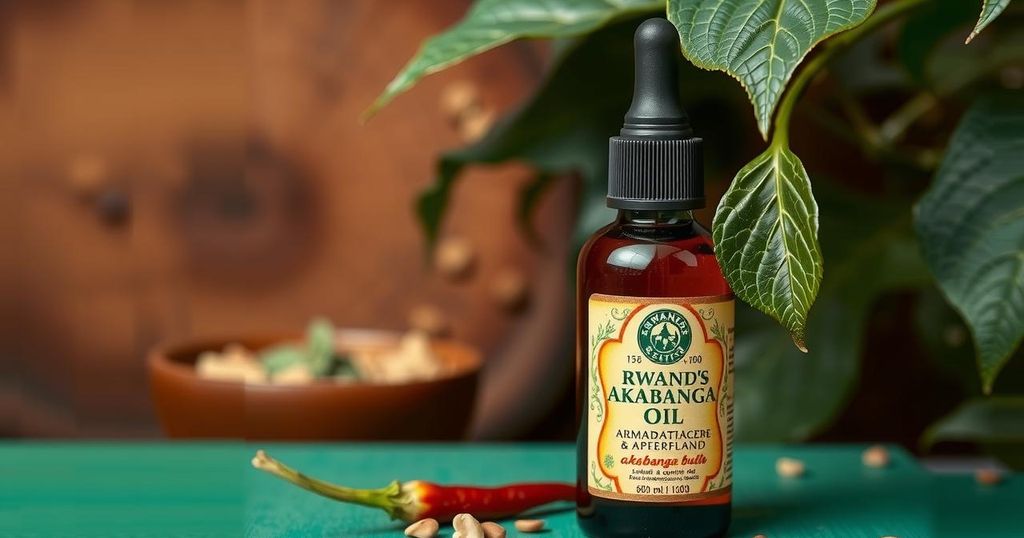Akabanga Chile Oil: Rwanda’s Culinary Secret Unveiled
Akabanga chile oil, a staple in Rwandan cuisine, has gained recognition for its intense heat and unique flavor. Originating from traditional urusenda made by street vendor Sina Gerard, this condiment blends habanero and African bird’s eye chilies. Its popularity continues to rise, symbolizing Rwandan culture and culinary pride, as it finds applications in diverse global dishes.
In a recent episode of Taste the Nation, host Padma Lakshmi introduced viewers to suya-spiced meat alongside actress Yvonne Orji. Lakshmi humorously remarked on the intense spiciness of the dish, stating, “It’s so spicy, my scalp is itching!” This amusing moment, resonating with spice enthusiasts, prompted me to reflect on my own experiences with heat until I encountered Akabanga chile oil, a cherished condiment originating from Rwanda.
This past summer, a friend presented me with a small bottle of Akabanga as a gift from her visit to Rwanda. Before discovering Akabanga, my collection of chile oils varied from the mild Rayu to the intensely flavored Sichuan variety. However, the vibrant, fluorescent-orange Akabanga elicited both curiosity and caution as I decided to indulge by dipping my grilled cheese sandwich into the exceptionally potent oil. What unfolded was an immediate sensation of warmth radiating across my face, accompanied by that now-familiar scalp tingling.
Known as “the secret” in Kinyarwanda, Akabanga symbolizes more than a condiment; it represents a culinary legacy. It is a well-known iteration of urusenda, an oil made with habanero and African bird’s eye chilies, beloved in both homes and eateries across sub-Saharan Africa. The flavor profile of Akabanga is unique—initially it presents a savory richness reminiscent of grilled meats, followed by an electrifying heat that compels you to keep reaching for more.
The history of Akabanga dates back to the early 1980s when street vendor Sina Gerard developed his urusenda to accompany fried dough fritters known as mandozi. His original recipe blended 80% chile extract with 20% vegetable oil, resulting in a rich, smoky flavor that proved to be both fiery and addictive. Gerard’s creation quickly gained popularity, leading him to commercialize his condiment, ultimately achieving financial success.
“Growing up, most households made their own version of urusenda, so packaged spices weren’t common for us,” stated chef Vasta Muhimpundu, emphasizing the cultural significance of this product in Rwandan kitchens. Over time, the convenience of Akabanga transformed it into a staple item in the pantry, with its name becoming synonymous with the traditional chile oil throughout Rwanda and beyond.
Akabanga has established itself in the broader context of culinary culture; Jane Nshuti, a food educator, analogizes its importance to that of ketchup in American cuisine. “Akabanga evokes national pride and cultural heritage,” she notes, underscoring its role in celebrating Rwandan identity. This versatile oil finds applications across a variety of dishes, functioning as a dipping sauce, a flavor enhancer for curries, and even a finishing touch for various meals.
Dylan Keenan, owner of Heat Hot Sauce Shop, recounted his experience importing Akabanga and noted its growing popularity in recent years among consumers seeking simplicity in flavor. He highlighted the oil’s unique qualities, which set it apart from other hot sauces on the market. Akabanga’s culinary versatility extends to enhancing soups, stews, and even pasta dishes, transforming everyday meals with just a few drops.
“I catch the distinct aroma of Akabanga and I’m instantly enveloped in the comforting embrace of home,” commented Nshuti, emphasizing the emotional connection many Rwandans have with the oil. Each interaction with Akabanga rekindles treasured memories of familial cooking and joyful gatherings, illustrating the deep-rooted significance of this condiment in Rwandan culture.
Akabanga chile oil, derived from a blend of habaneros and African bird’s eye chiles, is a celebrated condiment in Rwandan cuisine. The name ‘Akabanga,’ meaning ‘secret’ in Kinyarwanda, encapsulates its allure and popularity both within Rwanda and among expatriate communities. Historically birthed from street food traditions, Akabanga has evolved from homemade versions into a commercial product thanks to the entrepreneurial spirit of its creator, Sina Gerard. Its unique flavor profile and intense heat designate it as a culinary staple in numerous households, symbolizing pride and cultural heritage for Rwandans.
In summary, Akabanga chile oil stands as a testament to Rwandan culinary tradition, blending warmth, flavor, and cultural significance. Its growing footprint in global cuisine reflects an increasing appreciation for diverse food cultures. As culinary enthusiasts continue to explore international flavors, Akabanga’s distinct characteristics offer a unique addition to kitchens worldwide, indeed making it Rwanda’s best-kept secret worth discovering.
Original Source: www.eater.com




Post Comment